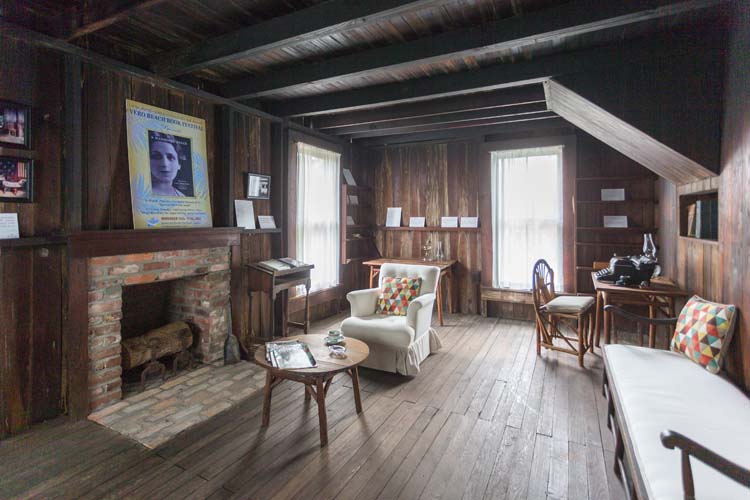
The Laura Riding Jackson house, one of Indian River County’s most historic and picturesque buildings, has likely found a new home on the Vero Beach campus of Indian River State College.
College Provost Casey Lunceford told Vero Beach 32963 that “we are in the process of preparing a memorandum of understanding” that should go before the college Board of Trustees at its August or September meeting. “I’m excited about it,” he said.
Last year, the Laura Riding Jackson Foundation board was surprised and dismayed to learn that the 118-year-old structure, one of the few remaining examples of Florida Cracker architecture and home of the widely noted 20th Century poet and environmentalist, would have to be relocated from the site it had occupied on the Environmental Learning Center campus for a quarter century to accommodate the Center’s multimillion-dollar expansion project.
The home was moved to the ELC campus years ago to save it from being demolished, and the Foundation has since paid $2,100 a year to the ELC, via a 5-year renewable lease. At the ELC’s island location, the charming house served as a gathering place for well-attended literary and educational events, and provided a tangible example of sustainable architecture and a sense of history on the otherwise modern campus.
With the current lease set to expire in December, no funding on hand for the move, and no new location identified, the fate of the house seemed precarious when ELC leaders announced it did not fit into their plan for the Center’s future.
After a January story in Vero Beach 32963 revealed the home’s plight, Foundation President Marie Stiefel scheduled a meeting to gather ideas and options from the public and was overwhelmed with the positive response: “We have felt alone – but we’re not,” said Stiefel. “There is so much support – it is a tribute to the people of Vero Beach.”
Several governmental entities and private organizations offered support and relocation ideas. The college, via Lunceford, was one of the most enthusiastic: The Vero Beach campus of Indian River State College, he said, offers a convenient location, plenty of space, sufficient parking and a venue compatible with the home’s numerous historic and literary associations.
“It’s ideal,” Lunceford said at the time. “We like the educational aspect. The west side of our campus is very open and natural. Accessibility is not a problem. We have the space, and we’d be glad to host [this important historic house].”
ELC leaders have been helpful as well. Executive Director Molly Steinwald made it clear the ELC expansion master plan would indeed require all the campus’ acreage but said there was no immediate deadline for removing the house, and in July, the learning center extended the lease renewal deadline for a year, giving the Foundation more time to finalize relocation plans.
Foundation board member and Indian River County’s first poet laureate Sean Sexton has said that being forced to relocate could well be blessing in disguise. He is excited about the possibility of moving the irreplaceable structure to the college campus near the Indian River Mall.
Sexton said the college location would offer convenient access for visitors, events and classes, along with a ready-made demographic focused on education and inclined to appreciate the home’s historic and literary value: In May, it was named by the Florida Trust for Historic Preservation as among “the most threatened historic properties in the state”; it’s also listed as a Friends of Libraries USA Literary Landmark.
The Foundation board is now compiling a list of expenses related to the move, including painstakingly disassembling and then reassembling much of the house; hooking up to electric, water and sewer infrastructure; landscaping at the new location; and achieving ADA compliance.
If the college board of trustees approves the proposal as expected, the transportation cost alone – moving the century-old structure from south of the Wabasso Causeway to the West Vero Corridor on State Road 60 – would run at least $150,000, Stiefel said. The board continues to seek funding though grants and other avenues.
Of the potential partnership between the Foundation and the college, Stiefel says: “There are lots of wonderful possibilities. The synergy is terrific.”
Lunceford shares Stiefel’s enthusiasm, seeing a significant benefit to the college in “the mission of education the Laura Riding Jackson group brings to the table.”
Stiefel’s ultimate vision for the house is for it to become, someday, “a fully functioning author house museum, a place of historical, environmental and literary significance” such as the Hemingway House in Key West; Marjorie Kinnan Rawlings’ home in Cross Creek; and Robert Frost’s home in Vermont – “promoting literary programs that nurture passion for the written word; a place of literary legacy and history, and a center for education and personal growth through writing.”



